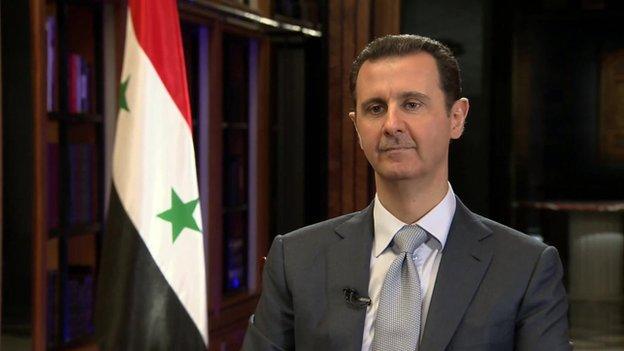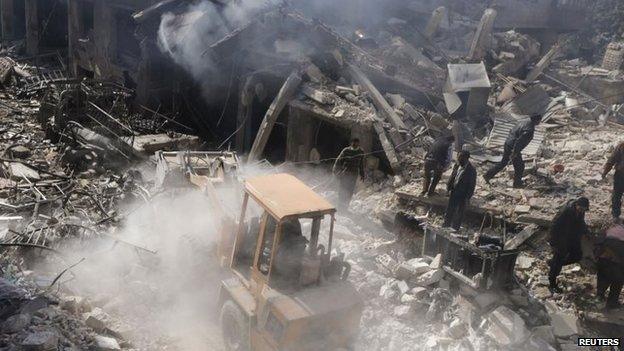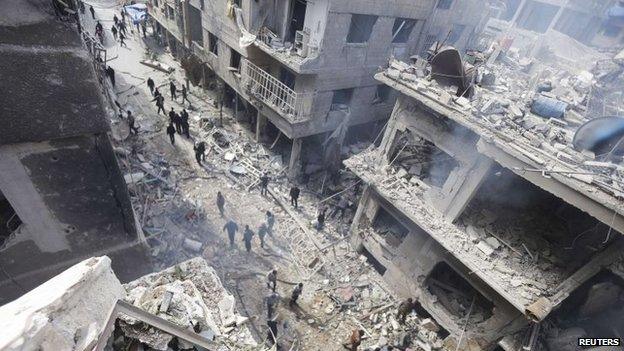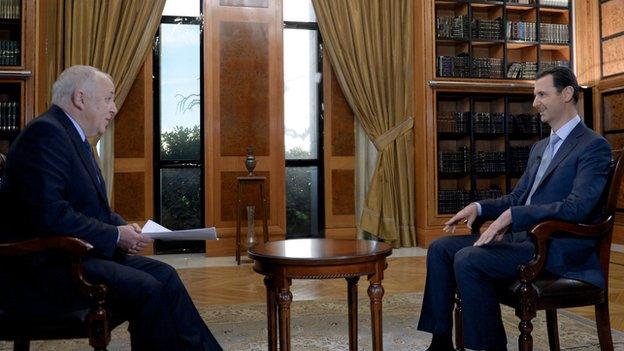Assad is firm in defending his actions in BBC interview
- Published

President Bashar al-Assad defended the conduct of the Syrian armed forces
President Bashar al-Assad looks remarkably relaxed for a man who has been at the centre of the catastrophe that has hit Syria in the last four years.
He is extremely polite, and smiles quite a lot.
But when it comes to defending his record, or the conduct of the Syrian armed forces, he is firm.
He repeated more than once, in different ways, during an interview lasting almost half an hour that as president he has been nothing more than a patriot, fighting to save his country from disaster.
War, he accepted, caused casualties. But Syrian soldiers, also patriots, would, he says, never harm their own people deliberately, as a matter of policy.
'Cooking pots'
In Syria, across the Middle East and around the world his many enemies will dismiss his view of the war.
For them, he has been in charge of a killing machine that has been chewing Syrians up and spitting them out.
As the war enters its fifth year, the barrel bomb has become the most notorious weapon in the regime's arsenal.
Two or three years ago, I saw the results of what must have been one in Douma, a suburb of Damascus that has been held by rebels since close to the beginning of the war.
Local people talked of seeing a large object being dropped from the back of a helicopter.

Rebel-held Douma has been hit hard by Syrian government forces

The president denied that the Syrian army has dropped barrel bombs on civilians
The explosion that it caused destroyed blocks of flats on either side of a fairly wide road.
A barrel bomb is an improvised device made typically from a man size plastic container packed with explosives and hard projectiles.
Mr Assad insisted that the Syrian army would never use them in a place where people lived.
"I know about the army. They use bullets, missiles and bombs. I haven't heard of the army using barrels, or maybe, cooking pots."
It was a flippant response; the mention of cooking pots was either callousness, an awkward attempt at humour, or a sign that Mr Assad has become so disconnected from what is happening that he feels overwhelmed.
Family business
It is hard to know who makes the decisions in Syria.
In the background are powerful figures like the president's brother Maher.
I have always believed that Bashar al-Assad, as the man who inherited the presidency, effectively the family business, is the chairman of the board.
His job, more than any other, is to preserve family control of the company.
During the interview we didn't just talk about barrel bombs.
I tried to put to him some of the hard points that have been on peoples' minds.

Mr Assad also defended the besieging of rebel-held areas across Syria
The fact that Mr Assad has started giving interviews again to foreign broadcasters must be a sign that he is feeling more secure.
His enemies, and there are many, will reject most of what he told me.
But the last few years have shown that Bashar al-Assad is not to be underestimated.
His end has been predicted repeatedly since the war started. Instead, he is looking as secure as ever.